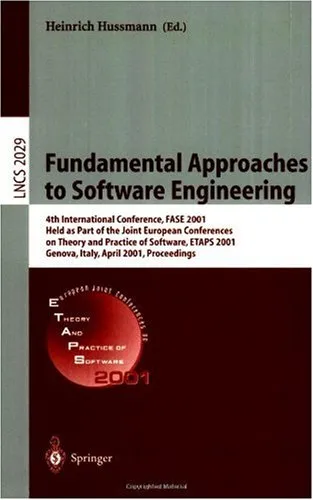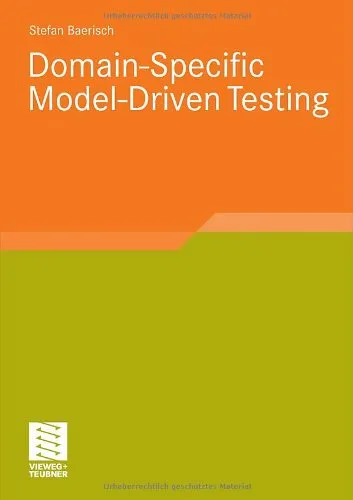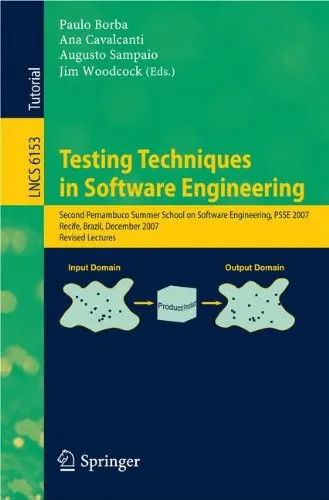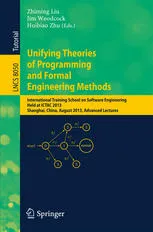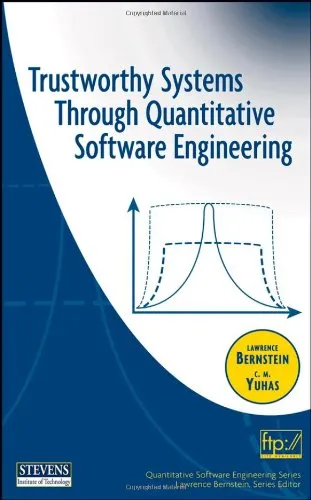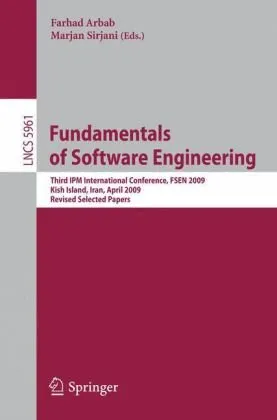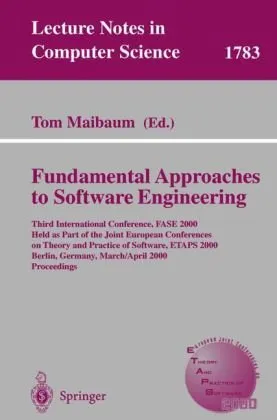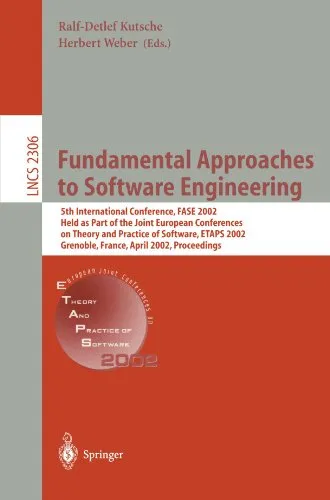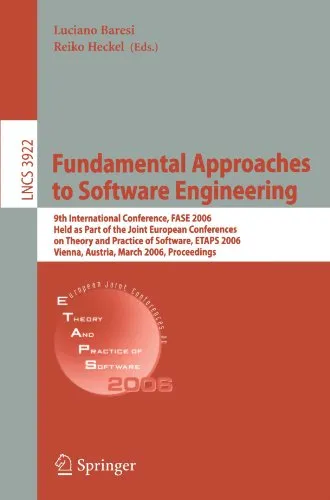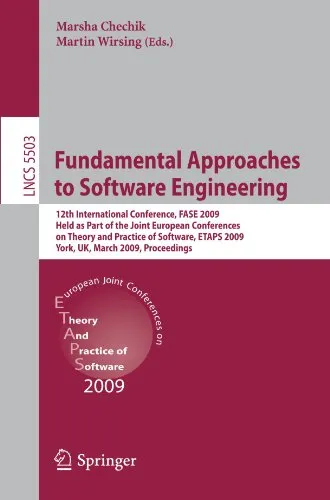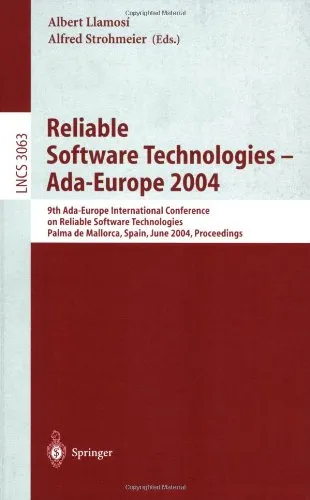Fundamental Approaches to Software Engineering: 4th International Conference, FASE 2001 Held as Part of the Joint European Conferences on Theory and Practice of Software, ETAPS 2001 Genova, Italy, April 2–6, 2001 Proceedings
4.0
بر اساس نظر کاربران

شما میتونید سوالاتتون در باره کتاب رو از هوش مصنوعیش بعد از ورود بپرسید
هر دانلود یا پرسش از هوش مصنوعی 2 امتیاز لازم دارد، برای بدست آوردن امتیاز رایگان، به صفحه ی راهنمای امتیازات سر بزنید و یک سری کار ارزشمند انجام بدینکتاب های مرتبط:
معرفی کتاب "Fundamental Approaches to Software Engineering"
کتاب "Fundamental Approaches to Software Engineering" بهعنوان یک سند برجسته و جامع، نتایج چهارمین کنفرانس بینالمللی FASE 2001 را که در قالب بخشی از کنفرانسهای مشترک اروپایی درباره نظریه و عمل نرمافزار (ETAPS 2001) برگزار شده است، ارائه میکند. این نشست که در جنوا، ایتالیا در آوریل ۲۰۰۱ برگزار شد، مجموعهای از جدیدترین پژوهشها، تکنیکها و رویکردهای مرتبط با مهندسی نرمافزار را گرد هم آورد. این کتاب منبع ارزشمندی برای پژوهشگران، متخصصان و دانشجویانی است که به دنبال درک عمیقتر و گستردهتر موضوعات مطرح در مهندسی نرمافزار هستند.
خلاصهای از کتاب
این کتاب شامل مجموعه مقالات و تحقیقات ارائهشده در کنفرانس است که توسط پژوهشگران برجسته از سراسر جهان نوشته شده است. در این مقالات، موضوعات متنوعی از قبیل روشهای مدلسازی پیشرفته، ابزارهای تحلیل و طراحی نرمافزار، و تکنیکهای جدید validation و verification بررسی شدهاند. محوریت اصلی این کنفرانس و کتاب، بررسی رویکردهای بنیادی به مسائل مهندسی نرمافزار است، بهطوریکه تصویری جامع از وضعیت کنونی و روندهای آینده این حوزه ارائه میدهد.
با توجه به اینکه این حوزه علمی به سرعت در حال تغییر و تحول است، محتوای این کتاب نه تنها به بررسی چالشها و مسائل پیچیده حال حاضر میپردازد، بلکه به ارائه راهحلها و الگوریتمهای نوین نیز کمک میکند. از این رو، خوانندگان میتوانند انتظار داشته باشند که با مطالعه این کتاب به دانش و بینشی تازه در زمینههای طراحی نرمافزار، ایمنی سیستمها، و بهینهسازی فرآیندهای توسعه نرمافزاری دست یابند.
یادگیریهای کلیدی
- آشنایی با پیشرفتهترین روشهای طراحی و توسعه نرمافزار.
- درک اصول fundamental در validation و verification نرمافزار.
- یادگیری تکنیکهای مدرن برای مدلسازی و تحلیل سیستمهای پیچیده.
- کسب اطلاعات درباره ابزارهای جدید و نوآورانه برای بهینهسازی فرآیندهای مهندسی نرمافزار.
- بررسی چالشهای رایج در توسعه نرمافزار و ارائه راهحلهای کارآمد با استفاده از رویکردهای علمی.
نقلقولهای مشهور از کتاب
"The fundamental principles in software engineering lie in the systematic and scientific approach to analyzing, designing, and verifying software systems."
"Proper modeling is not just a step in software development; it is the bedrock upon which all successful software projects are built."
چرا این کتاب مهم است؟
این کتاب نه تنها بهعنوان یک مجموعه علمی برای متخصصین حوزه مهندسی نرمافزار شناخته میشود، بلکه بهعنوان مرجعی بیبدیل برای توسعهدهندگان و دانشجویانی که به دنبال ارتقاء دانش خود در این زمینه هستند، اهمیت دارد. با توصیف چالشهای پیشرو و ارائه ابزارها و روشهای نوین، این اثر به طور قابل توجهی به پیشبرد دانش مهندسی نرمافزار کمک کرده است.
همچنین، همکاری پژوهشگران برجسته از سراسر جهان در گردآوری این کتاب، تضمینکننده کیفیت علمی آن است. این اثر نشاندهنده همگرایی تئوریهای نرمافزاری و کاربردهای واقعی آنها است، و از اینرو کمک میکند تا فاصله میان تحقیق آکادمیک و صنعت کاهش یابد.
Introduction
Welcome to Fundamental Approaches to Software Engineering: 4th International Conference, FASE 2001. This book presents the proceedings of the 4th International Conference on Fundamental Approaches to Software Engineering (FASE 2001), held as part of the prestigious European Joint Conferences on the Theory and Practice of Software (ETAPS) in April 2001, in the historic city of Genova, Italy. Edited by renowned experts Bran Selic and Heinrich Hussmann, this invaluable volume offers a comprehensive exploration of software engineering methodologies, foundational theories, and innovative techniques.
Software engineering is a rapidly evolving field, where advances in both theory and practice profoundly impact the development of reliable, flexible, and efficient software systems. Recognizing these challenges, the FASE conference aims to create a bridge between theoretical research and applied engineering practices. This book brings together a wealth of knowledge, featuring contributions from leading academics and professionals worldwide. With its cutting-edge discussions, the proceedings lay a strong foundation for solving contemporary software engineering challenges while also envisioning the future of this dynamic discipline.
Detailed Summary
The content of the book delves into various critical aspects of software engineering, presenting advancements in formal methods, model-driven design, programming languages, verification, and validation techniques.
It begins by addressing model-based engineering practices, an area pivotal in structuring modern software frameworks. The authors highlight the rise of model-driven architecture (MDA), which emphasizes models as the core of system design and implementation. Discussions extend to tool support for modeling and efficient transformations between requirements and executable code.
Another essential topic is the integration of formal methods into software development. The book outlines the benefits of bridging precise mathematics-based approaches with agile development paradigms to improve software correctness and robustness. Chapters also explore concurrency in software systems, the verification of property-based requirements, and the application of automated theorem proving in software engineering practices.
The proceedings further investigate software reliability and scalability. Techniques such as static and dynamic analysis, code synthesis, and testing are rigorously examined to ensure the smooth operation of large-scale systems. Finally, the role of software tools and environments in actively supporting each phase of the lifecycle—from design and prototyping to maintenance—is discussed in depth.
Key Takeaways
- Model-driven design is increasingly influencing the future of software engineering, emphasizing high-level abstractions over low-level programming details.
- Formal methods provide an essential foundation for improving software reliability, and their integration with practical techniques is becoming more pronounced.
- Emerging tools and automated workflows pave the way for more efficient and scalable software development processes.
- Theoretical approaches to programming languages and frameworks continue to be vital for supporting modern, flexible software solutions.
Famous Quotes from the Book
"Building reliable systems depends on more than just technical expertise; it requires a deep understanding of the theoretical principles underpinning software creation and the practical challenges of real-world systems."
"The future of software engineering lies in our ability to successfully merge theoretical rigor with agile innovation."
Why This Book Matters
In the fast-paced world of software development, building high-quality software systems requires a harmonious balance of scientific research, engineering excellence, and innovative thinking. This book plays a pivotal role in advancing this mission by consolidating exceptional research contributions in a single, highly accessible volume.
By providing actionable insights into model-based and formal methods, the book equips researchers, students, and practitioners with the tools they need to tackle modern-day software engineering challenges. Moreover, its focus on the interplay between theory and practice ensures its relevance not only for academics but also for industry professionals striving to stay ahead in a competitive landscape.
As an indispensable resource for anyone deeply invested in software engineering, the FASE 2001 proceedings highlight the fundamental approaches that continue to shape the evolution of this dynamic discipline. Whether you are a researcher exploring the frontiers of formal verification or an engineer looking for practical insights into model-driven designs, this book offers a comprehensive guide to understanding the field's current trends and future directions.
دانلود رایگان مستقیم
شما میتونید سوالاتتون در باره کتاب رو از هوش مصنوعیش بعد از ورود بپرسید
دسترسی به کتابها از طریق پلتفرمهای قانونی و کتابخانههای عمومی نه تنها از حقوق نویسندگان و ناشران حمایت میکند، بلکه به پایداری فرهنگ کتابخوانی نیز کمک میرساند. پیش از دانلود، لحظهای به بررسی این گزینهها فکر کنید.
این کتاب رو در پلتفرم های دیگه ببینید
WorldCat به شما کمک میکنه تا کتاب ها رو در کتابخانه های سراسر دنیا پیدا کنید
امتیازها، نظرات تخصصی و صحبت ها درباره کتاب را در Goodreads ببینید
کتابهای کمیاب یا دست دوم را در AbeBooks پیدا کنید و بخرید
1205
بازدید4.0
امتیاز0
نظر98%
رضایتنظرات:
4.0
بر اساس 0 نظر کاربران
Questions & Answers
Ask questions about this book or help others by answering
No questions yet. Be the first to ask!
